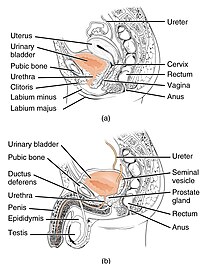
Photo from wikipedia
Background: Enuresis is one of the most common childhood problems. Our study aimed to evaluate children with enuresis by renal bladder ultrasound (RBUS) to detect urological abnormalities and to compare… Click to show full abstract
Background: Enuresis is one of the most common childhood problems. Our study aimed to evaluate children with enuresis by renal bladder ultrasound (RBUS) to detect urological abnormalities and to compare the sonographic findings with control group. Methods: Our study included 30 children with primary monosymptomatic nocturnal enuresis (PMNE). Another 30 matched children with normal continence to urine were assigned as controls. The 2 groups were subjected to urine analysis, serum creatinine, and RBUS. Results: Ultrasound showed abnormality in 10% of case group, which was not significantly different from controls (p = 1.000). Conclusion: Abnormalities discovered by ultrasonography in PMNE are more than in control group but without statistical significance and do not require invasive diagnostic tests. Children with sonographic abnormalities appear to be more resistant to treatment. We concluded that ultrasound is not necessary in MPNE and should be done in patients resistant to treatment.
Journal Title: Clinical Pediatrics
Year Published: 2022
Link to full text (if available)
Share on Social Media: Sign Up to like & get
recommendations!